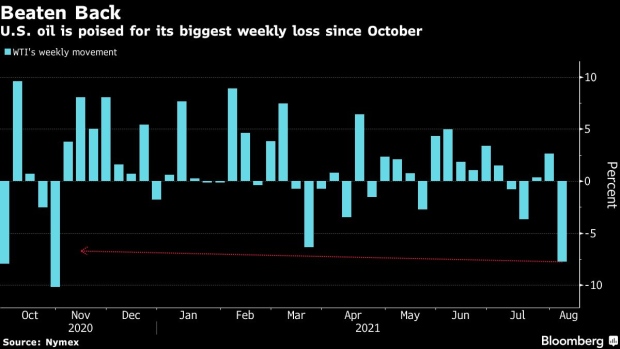Aug 6, 2021
Oil caps worst week in 10 months as Delta fears shake outlook
, Bloomberg News
Oil fell, capping the biggest weekly loss since October, as the spread of the delta coronavirus variant in China and elsewhere in the world is casting doubts on demand growth.
West Texas Intermediate futures dropped 1.2 per cent Friday and 7.7 per cent for the week. The dollar rose following a better-than-expected U.S. jobs report, weakening the appeal of commodities priced in the currency. China has imposed increasingly strict restrictions on mobility to fight the spread of the deadly variant, while records in daily cases were set in Thailand and Sydney, Australia.
“The market is reacting to the concern that the delta variant, particularly in Asia, may erode mobility significantly,” says Bart Melek, head of global commodity strategy at TD Securities. “That implies that we could see significantly less tightness in pricing than we saw prior to this big virus concern.”

After crude soared in the first half of the year on surging demand, the latest chapter in the pandemic has capped prices of not just oil but some other commodities as well. The premium for the nearest WTI contract over second-month futures, known as the promt spread, narrowed to 18 cents after reaching 72 cents a week ago, pointing to ongoing concerns about demand.
“The oil market has struggled this week,” said Jens Naervig Pedersen, a senior analyst at Danske Bank A/S. “On the one hand, markets worry about economic implications of the spreading of the delta variant, but on the other, policy accommodation gives a strong backdrop.”
Prices:
- WTI for September delivery dipped 81 cents to settle at US$68.28 a barrel in New York
- Brent for October fell 59 cents to end the session at US$70.70 a barrel in London
Despite the weak outlook for demand from Asia, there are some improved metrics in the U.S., where roads have remained busy. Vehicle miles traveled on highways in the week to Aug. 1 match the similar week in 2019, before the pandemic hit, according to the Department of Transportation. Gasoline deliveries to the Spanish market jumped above pre-pandemic levels last month.
“It’s hard to not get caught up in the headlines showing rising cases, particularly in China,” said Daniel Hynes, senior commodities strategist at Australia and New Zealand Banking Group Ltd. “However, when you take a step back, restrictions are still being eased back across most regions, demand seems to be holding up, and I think the impact on this latest wave should be significantly less than previous ones.”
Related coverage:
- Saudi Arabia’s move to push up the cost of its oil in Asia may backfire as an delta outbreak in China damps demand, while the U.S. and Russia offer more competitively priced alternatives.
- Ghana National Petroleum Corp. got parliamentary approval to negotiate stakes in energy assets to accelerate oil and gas exploration in the West African nation.


